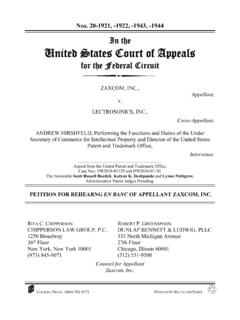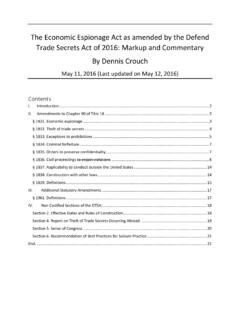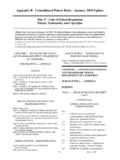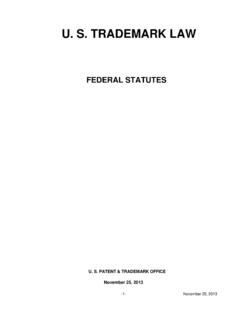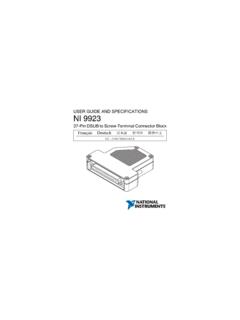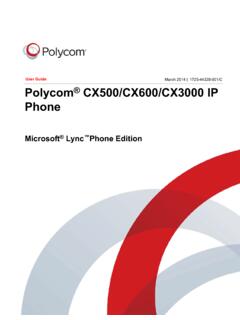Transcription of UNITED STATES COURT OF APPEALS FOR THE FEDERAL …
1 2022-1420 _____ UNITED STATES COURT OF APPEALS FOR THE FEDERAL CIRCUIT _____ KEVIN P. CORRELL, Plaintiff-Appellant, v. ANDREW HIRSHFELD, PERFORMING THE FUNCTIONS AND DUTIES OF THE UNDER SECRETARY OF COMMERCE FOR INTELLECTUAL PROPERTY AND DIRECTOR OF THE UNITED STATES patent AND trademark office , Defendant-Appellee, _____ Appeal from UNITED STATES District COURT for the Eastern District of Virginia in Case No. 1:21cv898, Judge Anthony J. Trenga _____ OPPOSITION TO PLAINTIFF-APPELLANT S EMERGENCY MOTION TO STAY AGENCY ACTION Case: 22-1420 Document: 11-1 Page: 1 Filed: 02/28/2022 - 1 - INTRODUCTION Nearly 170 years ago, in the wake of the Civil War, Congress concerned about skepticism from the Nation about the integrity of the decisions that the FEDERAL government made to grant benefits to particular individuals and entities promulgated a statute that prohibited FEDERAL employees from representing others in proceedings before the same government that employed them.
2 Despite knowing of these prohibitions, Kevin Correll violated them approximately 300 times over a span of fifteen years, providing legal representation for a substantial fee in proceedings before the UNITED STATES patent and trademark office ( USPTO ) to private clients who sought personal patent and trademark protection while employed by the UNITED STATES Department of the Navy. After administrative disciplinary proceedings resulted in Correll s suspension from practice before the USPTO for sixty months, Correll requested Article III judicial review of that suspension. Correll immediately sought a preliminary injunction staying his suspension pending the completion of judicial review. The District COURT denied Correll s request for this form of extraordinary relief, holding that Correll was not likely to succeed on his position that the suspension ran afoul of the First Amendment.
3 Correll now asks this COURT to enter his sought injunction on an emergency basis. This COURT should deny the motion. Correll cannot come close to bearing his heavy burden of showing that he is ultimately likely to succeed in obtaining reversal of Case: 22-1420 Document: 11-1 Page: 2 Filed: 02/28/2022 - 2 - both the USPTO s disciplinary decision and the District COURT s affirmance of the same. As the District COURT correctly held, Correll s primary argument is without merit; , that application of the aforementioned conflict of interest statutes to his representation of private clients for a fee in proceedings before the USPTO while employed by the FEDERAL government runs afoul of his First Amendment rights. The limitations on Correll s speech and association activity from these statutes are minimal, as he is free to speak on any topic (including patent and trademark regulation), in any form (speeches, journal articles), to any audience ( FEDERAL courts, state and local government agencies, interest groups) save one: the representation of private interests in specific business before the FEDERAL Executive Branch.
4 And the government s interest in preventing even the appearance of impropriety is extremely strong. STATEMENT OF THE CASE I. PROFESSIONAL REGULATION OF PRACTICE before THE USPTO Through two separate statutory provisions, Congress has vested the USPTO with the authority to promulgate regulations govern[ing] the recognition and conduct of agents, attorneys, or other persons representing applicants or other parties before the office . 35 2(b)(2)(D); see also id. 32 (providing that the USPTO may .. suspend or exclude .. from further practice before the patent and trademark office , any person, agent, or attorney .. who does not comply with the regulations established under 2(b)(2)(D) ). The USPTO has thus promulgated a number of Case: 22-1420 Document: 11-1 Page: 3 Filed: 02/28/2022 - 3 - regulations governing who may engage in practice concerning matters that are before the agency and how that practice is to be undertaken.
5 See 37 (2012); 37 (2020). Of premier importance here, the USPTO Code and Rules provide that any practitioner who is a former or current FEDERAL Government employee may not engage in any conduct which is contrary to applicable FEDERAL ethics law, including conflict of interest statutes. Id. (emphasis added); see also id. (d) (2002). For well over a century, Congress has repeatedly expressed through legislation its ongoing concern about the appearance of impropriety that arises when an employee of the UNITED STATES advocates before a FEDERAL agency on behalf of a private individual or entity s interests. First, in 1853, Congress passed a statute that precluded FEDERAL employees from assisting private individuals or entities in prosecuting claims against the UNITED STATES . See Van Ee v.
6 EPA, 202 296, 305 ( Cir. 2000) (discussing former 18 283). But after a series of high-profile procurement scandals resulted in a significant public outcry, Congress promulgated stronger conflict of interest prohibitions in order to confirm that having a FEDERAL employee in one s proverbial corner could not provide any additional assistance in their business with the government. Id. at 305-06 & To this end, in 1864, Congress prohibited FEDERAL employees from receiving any compensation for any services rendered .. in relation to any proceeding, contract, claim, controversy, charge, accusation, arrest, or other matter or thing in which the UNITED STATES had an Case: 22-1420 Document: 11-1 Page: 4 Filed: 02/28/2022 - 4 - interest. Id. at 306 & (discussing former 18 281). The essence of this latter proscription has remained in force until the present day.
7 After the size of the FEDERAL government grew, Congress strengthened these statutes, concluding that recent years ha[d] recorded a growing concern .. with the ever present and perplexing problem of how best to assure high-ethical standards in the conduct of the FEDERAL Government. RPT. 87-748, at 2 (July 20, 1961). Congress specifically explained that it was necessary to protect the integrity of Government actions by preventing its employees from using actual or supposed influence in support of private causes. Id. at 21. Congress thus promulgated two new statutes, which were subsequently codified at 18 203 and 205. Initially, 203 replaced the former 281, and generally prohibits FEDERAL employees from receiving any compensation for any representational services .. rendered with respect to: [A]ny proceeding, application, request for a ruling or other determination, contract, claim, controversy.
8 Or other particular matter in which the UNITED STATES is a party or has a direct and substantial interest, before any department, agency, COURT , COURT -martial, officer, or any civil, military, or naval commission. 18 203(a)(1) (emphasis added). And in a new statutory section, Congress prohibited FEDERAL employees from act[ing] as agent or attorney for anyone before any department, agency, COURT , COURT -martial, officer, or civil, military, or naval commission in connection with any covered matter in which the UNITED STATES is a party or has a direct and substantial interest, regardless of whether they receive Case: 22-1420 Document: 11-1 Page: 5 Filed: 02/28/2022 - 5 - compensation. 18 205(a). The statute defines covered action to include any judicial or other proceeding, application, request for a ruling or other determination.
9 Or other particular matter. Id. 205(h). The Attorney General of the UNITED STATES and the office of Government Ethics have concluded that the USPTO s examination of an application for a patent or trademark registration fits well within 203 and 205 s prohibitions. See Government Employees Prosecuting Claims for patent , 41 Op. Atty. Gen. 21, 22 (July 18, 1949); OGE Advisory Op., 2001 WL 34091910, at *1-2 (Mar. 14, 2001). II. FACTUAL BACKGROUND A. CORRELL S FEDERAL EMPLOYMENT & COLLATERAL LEGAL PRACTICE In 1999 and 2000, respectively, Kevin Correll was admitted to the bar of Massachusetts, and was registered with the USPTO as a patent attorney. Ex31-32. 1. In September 2002, Correll accepted a position of FEDERAL employment with the UNITED STATES Department of the Navy. Ex32. Between 2002 and 2017, Correll served as an electrical engineer with the Naval Undersea Warfare Center ( NUWC ) of the Naval Sea Systems Command, in Newport, Rhode Island.
10 Ex34-35. During most of his Naval employment, one of Correll s collateral duties was to serve as a voting member of NUWC s Invention Examination Board ( IAB ). Ex113. In that role, Correll reviewed technologies purportedly created at NUWC, assisted in determining whether the invention in question belonged to the Navy, and made Case: 22-1420 Document: 11-1 Page: 6 Filed: 02/28/2022 - 6 - recommendations as to those technologies on which NUWC should seek patent protection with the USPTO. Id. 2. Also in September 2002, at nearly the same time that he accepted and commenced his FEDERAL employment with the Navy, Correll started his own private law firm in Rhode Island. Ex35. That firm, which appears active today, provided legal services in patent and trademark matters to the public. Correll received compensation for his legal services.
